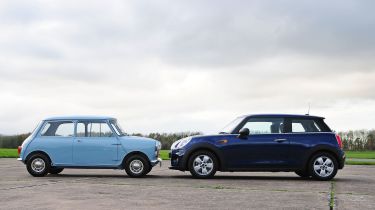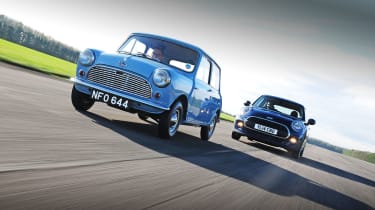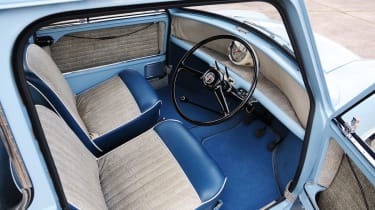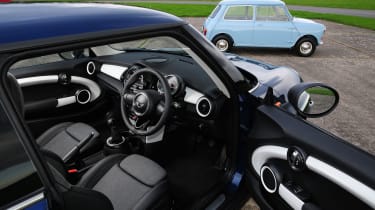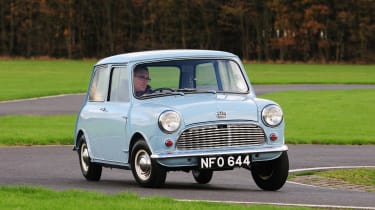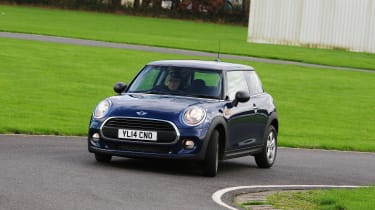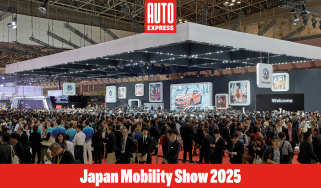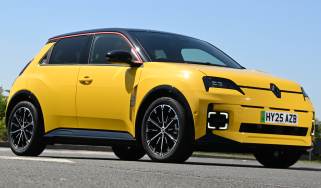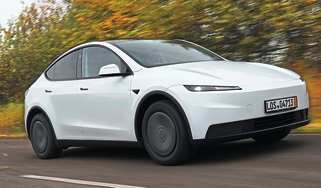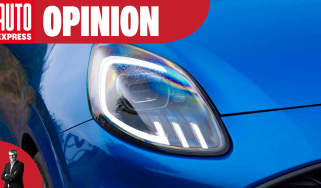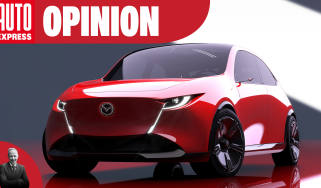The test of time: Classic Mini vs modern MINI
Our clash of the generations sees the modern MINI meet the car that kicked off the phenomenon in the sixties – the legendary original Mini
Conceived in the mid-fifties in the midst of Suez Crisis fuel shortages, the Mini was the British Motor Company’s answer to demand for an affordable small car. So, over half-a-century later, how does the original compare to the most basic version of the latest car – the new MINI One?
• The future of MINI: head man Jochen Goller reveals all
Mini vs MINI: exterior style
Well, in spite of the obvious size difference, there’s still a clear nod to the original Mini in the styling of the latest car, and both models exude plenty in the way of charm. With its innovative front-wheel-drive layout and space-saving transverse engine, the Mini completely changed the way that Britain looked at small cars. It was initially sold as the Austin Seven and Morris Mini-Minor, with the biggest difference being that the Austin featured an 11-bar horizontal grille compared to the Morris’ seven. Either way, the simplicity of the design of these early cars is arguably the Mini at its purest and most attractive.
With its visible welded seams and external door and boot hinges, rounded roofline and curved windscreen, it’s now an iconic design – so much so that the Rover Group registered the Mini’s shape as a trademark in the nineties.
Mini vs MINI: interior
While the latest car is bigger than ever, there’s no doubting that it’s a MINI, as its shape is unique. Climb inside, and the 2014 MINI is more modern than ever, although the smart design still features plenty of retro touches, including a dash dominated by a large circular infotainment pod which mimics the central speedo of the original.
Get inside the 1960 Mini after the new version, and it’s clear where the inspiration comes from. However, early cars were a lesson in basic functionality and came with few luxuries. Seatbelts and a radio weren’t included, and the spindly steering wheel, simple central speedo, bootlace-style door pulls and toggle switches kept components inside to a minimum. Even a heater was optional, although De Luxe cars featured interior carpets, an ashtray and windscreen washers.
• MINI Countryman ALL4 Racing Dakar Rally ride review
Still, with the passenger area accounting for 60 per cent of the car’s length, you can squeeze four adults in. Front seats tilt forward with ease, and they’re mounted just far enough forward to provide sufficient legroom in the back, thanks to the upright steering column. Early cars had sliding windows, which meant there was room for handy door bins, too.
Mini vs MINI: practicality
With its tiny, 10-inch wheels minimising wheelarch intrusion and the transverse engine/front-drive layout taking up barely any space up front, the Mini’s packaging was groundbreaking. Even the load area, with its drop-down bootlid, had space for things among the spare wheel and rear-mounted battery. Yet UK buyers, who traditionally associated car size with status, were initially slow to accept the limited practicality of the Mini.
Today, a 211-litre boot means the MINI is more practical than ever, and while passenger comfort is in a different league to its ancestor’s, the demands of modern safety mean today’s bigger model can’t match the Tardis-like tricks of the tiny original.
Mini vs MINI: driving
However, it wasn’t just genius packaging that set the original Mini apart; it was also entertaining to drive – and it still is today. Press the floor-mounted starter button, and the Austin’s 848cc four-cylinder engine rattles casually into life. The clutch needs to be released gently due to its low biting point, while the long, wand-like gearlever has to be shifted precisely to slot between the ratios of the four-speed box.
• Can the new MINI 5-door really be used as a family car?
The cable-operated throttle has a positive response, but the Austin only has 34bhp. Still, given that the car weighs just 585kg (almost 500kg lighter than the MINI One), the Mini doesn’t feel ridiculously underpowered. In fact, BMC had to detune the engine of the first prototypes, as bosses felt it gave too much performance for a small car.
On the move, 30mph feels like 70mph, and while the controls are slack compared to a modern car’s, you feel completely connected to the road. The unassisted steering lightens up at speed; and if you push on through a corner, you can feel the 10-inch wheels and crossply tyres scrabbling for grip, but the Mini’s agility makes it hugely engaging. For a drum-braked car, there’s a decent amount of bite to the middle pedal, while the Austin’s light mass helps it slow down quicker than a lot of its contemporary rivals.
Jump forward over 50 years to the modern MINI, and you’re reminded of the huge strides that have been made in refinement, handling, grip, braking and performance. The One’s three-cylinder engine is impressively smooth, while the smaller 16-inch wheels give the entry-level MINI better ride quality than Cooper and Cooper S versions. Like all modern MINIs, the One comes with a level of passive and active safety unimaginable in the late fifties when the original was developed.
Mini vs MINI: an icon vs a great modern car
Driving Minis separated by more than 50 years is an interesting exercise. Clearly, comparing cars from such different ages is tough, but the genius of the modern MINI is that it manages to encapsulate some of the charm, driving fun and classless appeal of the original in a modern, well built and safe hatchback.
Which would you choose? The classic Mini or the modern remake? Let us know in the comments section below...

The Magic of MINI: special feature
• The future of MINI: head man Jochen Goller reveals all• Classic Mini vs modern MINI: which is the better car?• How many MINIs? The MINI range reviewed• Eight design innovations that made the MINI• MINI's greatest concept cars• Paddy Hopkirk and the Mini that won the Monte Carlo Rally• Can the new MINI 5-door really be used as a family car?• MINI Countryman ALL4 Racing Dakar Rally ride review• MINI UK factory: how we make the MINI• MINI adverts: the campaigns that built the brand• Win a MINI for a year
Find a car with the experts
